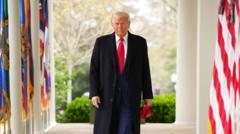As President Trump's tariffs loom, nations are either negotiating in hopes of averting economic fallout or retaliating against the U.S. Amidst market fluctuations and political maneuvers, the world watches closely to see if Trump's approach is a tactical negotiation or a fundamental shift in global trade dynamics.
Uncertainty Reigns as Trump’s Tariff Strategy Unfolds

Uncertainty Reigns as Trump’s Tariff Strategy Unfolds
President Trump’s impending tariffs spark global uncertainty, with nations scrambling to respond and market fears escalating.
A day before implementing his "reciprocal" tariffs, President Donald Trump is engaged in a tense standoff that has left the global economy in suspense. Nations labeled as "worst offenders" are urgently seeking to mend ties with the White House before the situation spirals into economic turmoil. In contrast, China is adopting a stance of defiance, aiming for retaliation rather than reconciliation.
Despite growing concerns from allies within Congress and investors on Wall Street, Trump maintains a firm course. When queried on potential market repercussions, he dismissed concerns as irrelevant. This raises questions: Is this merely a tactical strategy, or is Trump intent on fundamentally reshaping America's role in the global economy based on the principle of "fair deals"?
Israeli Prime Minister Benjamin Netanyahu, the first world leader to meet Trump since his tariff announcement, tried to align with the administration by proposing the elimination of trade barriers that would counteract the anticipated 17% tariff on his country. He expressed confidence that Israel could set a precedent for similar global actions.
Other countries are also attempting this conciliatory approach. Japan’s Prime Minister Shigeru Ishiba has reached out to establish negotiations to align with Trump’s objectives, while European Commission President Ursula von der Leyen indicated Europe’s willingness to engage in discussions aimed at zeroing tariffs on industrial products — a proposal that received Trump's partial endorsement.
China, however, is not backing down, responding to Trump’s increase of tariffs with a corresponding rise of their own. Trump subsequently warned of potential additional tariffs reaching 50% if China does not relent. In a sharp statement, U.S. Treasury Secretary Scott Bessent accused China of isolating itself and reiterated support for Trump's vision of global trade reform.
As these trade dynamics unfold, American markets have experienced significant volatility, with major stock indexes dropping sharply. Business leaders, including notable figures from Wall Street, have started to vocalize their apprehensions about Trump's tariff strategy in hopes of swaying the president's policies.
On the uncertainty of Trump's tariff timeline, one unexpected social media post hinting at a postponement briefly fueled market optimism, only for this to be quickly quashed by the White House. Trump reaffirmed his commitment to proceed without delay, hinting at a singular opportunity to implement his vision.
Among Trump's economic advisors, Peter Navarro clarified that this process isn't merely a negotiation but a fundamental shift expected from trading partners who have previously engaged in unfair practices. This upcoming change is not just about immediate tariff adjustments but indicates a potential broader systemic transformation.
Speculating on Trump's motives, some analysts suggest a strategic ambition encapsulated in the "Mar-a-Lago accord," which could pressure trading partners to depreciate the U.S. dollar on international exchanges. This would possibly enhance the affordability of American exports and weaken the value of China's currency reserves.
Since revealing his extensive tariff strategy, the White House has provided mixed signals regarding its objectives and duration. As the world braces for the impending tariff enforcement, the uncertain future of both U.S. markets and international trade remains a focal point of global attention.





















